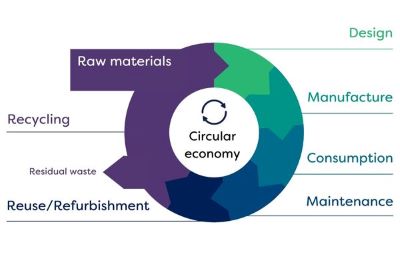Why is circular economy important to businesses?
Businesses of all sizes, industries and operations should consider the value of understanding and applying the circular economy.
In addition to environmental impacts, embedding circular economy practicing into your business can see financial, cultural, recruitment and longevity benefits.

What is the circular economy?
The circular economy is a framework that is based on sustainability and aims to eliminate waste, extend the lifespan of materials and rethink product design.
We, at Closed Loop, are guided by the Ellen MacArthur Foundation and use the framework as the core system for helping businesses make more sustainable decisions.
Learn more about what the circular economy is here.
6 reasons why your business should value the circular economy
Here are some reasons why taking a step away from the traditional take-make-waste model is important.
1. Financial benefits:
A study in Europe found that all industries that adopted circular economy practices saw economic benefits1.
Through our consulting service, we have also seen how investing in the circular economy has many financial and cost saving benefits. Financial benefits can be seen across cost reduction in waste management services, customer and client lifecycles and indirectly through recruitment.
2. Environmental and societal sustainability
The most important reason for businesses to adopt the circular economy model is for the benefit of the environment and society. Businesses need to be accountable for their impact and by minimising waste generation, reducing greenhouse gas emissions, and preserving natural resources, your business can play a pivotal role in protecting our environment.
3. Increased consumer affinity and trust:
In a crowded marketplace, it is beneficial for businesses to ensure that their business practices align with their consumers’ values. 51% of Australian shoppers reported that sustainability is an important factor when making a retail purchase2. Adopting a circular economy approach can be a great way to differentiate your business and attract a loyal customer base.
4. Attracts good talents:
The younger generations of workers, Gen Z and millennials, place a greater focus on environmental sustainability. A study found that more than half are willing to forgo a position if the business does not match their values3. Embracing circular economy practices is becoming a must for businesses to attract and retain top talent, foster employee engagement, and create a positive workplace culture that resonates with the values of the younger workforce.
5. Good for connection:
Businesses that demonstrate a commitment to environmental sustainability are more likely to form partnerships and collaborations with like-minded organisations. These connections not only expand market reach but also provide opportunities for revenue, knowledge sharing, innovation, and mutual growth.
6. Resource security and resilience:
Traditional linear models rely on the assumption of finite resources, which is unrealistic in the long term. Through redesigning products or processes, businesses can adopt circular practices such as remanufacturing, recycling and utilising renewable energy sources, to reduce their dependence on virgin resources.
Take action today
Over the past two decades, Closed Loop has supported and implemented a range of circular economy solutions. To find out how the circular economy model can benefit your business, reach out to our consulting team.
References:
1Growth within: A circular economy vision for a competitive Europe, Ellen MacArthur Foundation and the McKinsey Center for Business and Environment
2Sustainability attitudes and behaviours of Australian shoppers, Monash Business School
32023 Gen Z and Millennial Survey, Deloitte








